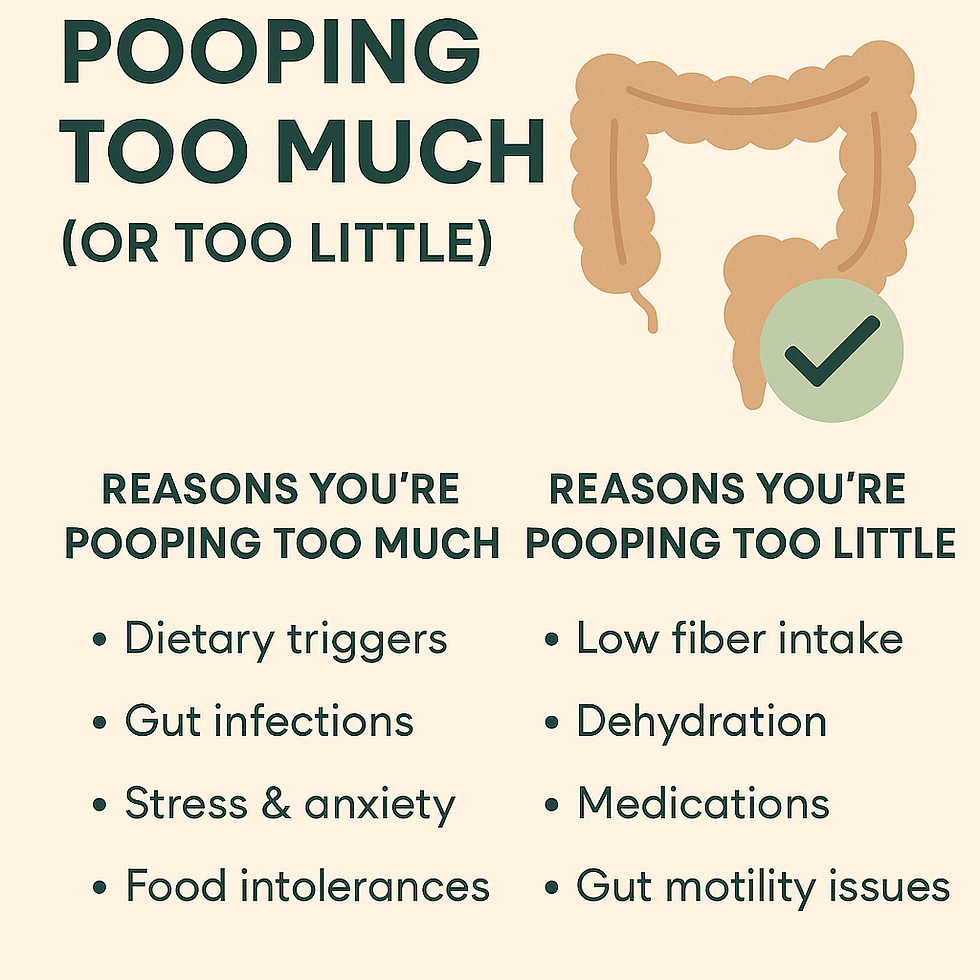Why You're Pooping Too Much (Or Not Enough
- Daniel Gigante
- 3 days ago
- 2 min read
Poop may not be a glamorous topic, but it’s one of the best ways to gauge your gut health. While everyone has their own “normal,” pooping too often or not enough can signal that something’s off with your digestive system.
Here’s what you need to know about bowel frequency, what’s considered normal, and when to take action.
✅ What’s Normal?
Most healthy adults poop anywhere from three times a day to three times a week. Anything outside this range might be a sign of:
Hyper-motility: Your gut moves too quickly, causing frequent poops or diarrhea.
Hypo-motility: Your gut slows down, leading to constipation and fewer bathroom trips.
Frequency is only part of the picture—stool consistency (see the Bristol Stool Chart) and ease of passing also matter.
🚩 Reasons You’re Pooping Too Much
Frequent bowel movements can be caused by:
Dietary triggers: High-fiber foods, caffeine, alcohol, or spicy meals speeding up digestion.
Gut infections: Viral or bacterial bugs causing diarrhea.
Stress and anxiety: The gut-brain connection can increase motility.
Food intolerances: Dairy, gluten, or artificial sweeteners causing loose stools.
Medical conditions: IBS-D, hyperthyroidism, inflammatory bowel disease.
🚩 Reasons You’re Pooping Too Little
Not pooping enough (fewer than 3 times per week) often signals constipation due to:
Low fiber intake: Not enough plant foods to bulk stool.
Dehydration: Dry stools that are hard to pass.
Lack of movement: Sedentary habits slow digestion.
Medications: Painkillers, antacids, and iron supplements.
Gut motility issues or pelvic floor dysfunction: Making elimination difficult.
Medical conditions: IBS-C, hypothyroidism, neurological issues.
How to Find Your Healthy Balance
If your bowel frequency feels “off,” these tips can help:
✅ Eat a fiber-rich, balanced diet with fruits, vegetables, and whole grains.
✅ Drink enough water to keep stools soft.
✅ Add probiotics and prebiotics to support gut bacteria.
✅ Exercise regularly to stimulate digestion.
✅ Manage stress, since your brain and gut work as a team.
✅ Identify food triggers by tracking what you eat and how it affects your bowels.
If symptoms persist, worsen, or are accompanied by pain, blood, or weight loss, consult a doctor.

Final Thoughts
Your gut has its own rhythm—and small fluctuations in poop frequency are normal. But pooping too much or too little consistently is worth paying attention to. With a few diet and lifestyle changes, you can often find your body’s natural, healthy balance and keep things moving smoothly.









コメント